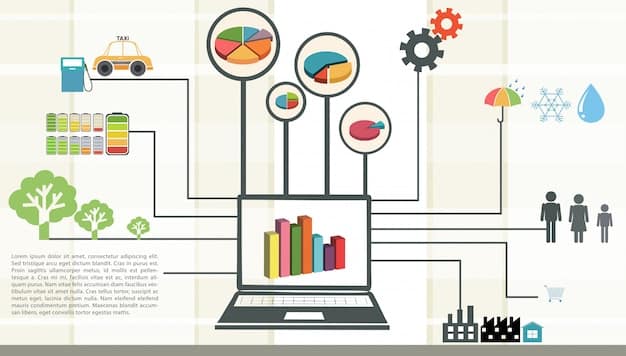Unveiling Neo-Tribal Trends Shaping US Subcultures in 2025

Unveiling the ‘Neo-Tribal’ Trends Shaping US Subcultures in Early 2025: A Data-Driven Analysis delves into the emerging social groupings driven by shared values, digital connectivity, and evolving cultural identities, offering a glimpse into the future of American subcultures.
The landscape of American subcultures is constantly evolving. As we approach 2025, new social groupings are emerging, driven by shared values, digital connectivity, and a desire for belonging. This article, Unveiling the ‘Neo-Tribal’ Trends Shaping US Subcultures in Early 2025: A Data-Driven Analysis, explores these “neo-tribal” trends, offering a glimpse into the future of how Americans are connecting and identifying.
Understanding the Rise of Neo-Tribalism
Neo-tribalism, a term coined by sociologist Michel Maffesoli, describes the formation of social groups based on shared emotions, lifestyles, and values rather than traditional social structures like family or nation. In the US, this phenomenon is increasingly visible, fueled by factors like social media, economic shifts, and a growing desire for authenticity.
These neo-tribes offer individuals a sense of belonging and identity in an increasingly fragmented world. They are often characterized by fluid membership, decentralized leadership, and a strong emphasis on shared experiences. Let’s delve into what’s driving this trend.
The Digital Influence
The internet and social media platforms are powerful catalysts for neo-tribalism. Online communities allow individuals with niche interests to connect and form bonds regardless of geographical location. These digital spaces provide a platform for sharing information, organizing events, and building a collective identity.
Erosion of Traditional Structures
Declining trust in traditional institutions like government and organized religion has also contributed to the rise of neo-tribes. Individuals are seeking alternative sources of meaning and community, finding them in these decentralized social groups.
- Shared interests create strong bonds within neo-tribes.
- Digital platforms enable global connection and community building.
- Neo-tribes offer alternative sources of meaning and belonging.
Neo-tribalism isn’t about replicating ancient tribal structures; it’s about creating modern communities that fulfill the basic human need for connection and belonging in innovative ways. This dynamic is reshaping the social landscape in the US, fostering new forms of identity and expression.
Data-Driven Insights into Emerging Subcultures
To understand the specific neo-tribal trends shaping US subcultures, a data-driven approach is essential. Analyzing social media trends, online forums, and consumer behavior provides valuable insights into the values, interests, and demographics of these emerging groups.
By examining the data, we can identify key trends and predict how these subcultures will evolve in the coming years. This also allows us to better understand the demographics and values of these groups.
Identifying Key Trends
Data analysis can reveal common threads connecting seemingly disparate subcultures. For example, a growing emphasis on sustainability and ethical consumerism is evident across various neo-tribes, from urban homesteaders to conscious consumers. Analyzing these shared values helps us understand the underlying motivations driving these groups.
Predicting Future Evolution
By tracking social media engagement and online conversations, we can anticipate how these subcultures will adapt and evolve. For instance, the rise of AI-generated art and music is likely to foster new neo-tribes centered around creative collaboration and technological innovation.

- Data analysis reveals common values across different subcultures.
- Tracking social media engagement predicts subculture evolution.
- Ethical consumerism and sustainability are driving many modern neo-tribes.
This approach provides a clearer picture of the driving forces behind these social shifts, enabling us to anticipate future trends and understand the evolving needs and values of these communities. These data-driven insights are increasingly essential for understanding the complexities of modern American subcultures.
The “Eco-Conscious Collective”: Sustainability as a Unifying Force
One of the most prominent neo-tribal trends in the US is the rise of the “Eco-Conscious Collective.” This subculture is driven by a shared commitment to sustainability, environmental protection, and ethical living. These values permeate their lifestyle choices, from food consumption to transportation.
This subculture is gaining momentum as concerns about climate change and environmental degradation intensify. The eco-conscious collective champions causes that lead to global improvement and long term positive effects.
Defining Values and Practices
Members of the Eco-Conscious Collective prioritize plant-based diets, reduce waste through recycling and composting, and advocate for renewable energy sources. They are also actively involved in community initiatives such as urban farming and local activism.
Digital Activism and Awareness
Social media plays a vital role in promoting these values and connecting like-minded individuals. Online campaigns, educational content, and community forums facilitate the sharing of information and inspire collective action. Hashtags like #SustainableLiving and #EcoFriendlyLife are pervasive in online discussions.
- Eco-Conscious Collectives prioritize sustainability and ethical living.
- Plant-based diets and waste reduction are common practices.
- Digital activism and social media awareness are key strategies.
The Eco-Conscious Collective represents a powerful example of how shared values can unite individuals and drive positive social change. Their commitment to sustainability and ethical living reflects a growing awareness of the importance of environmental stewardship.
The “Digital Nomad Network”: Redefining Work and Lifestyle
The Digital Nomad Network represents another significant neo-tribal trend, composed of individuals who embrace remote work and location independence. Fueled by technological advancements and a desire for greater autonomy, these digital nomads are redefining traditional notions of work and lifestyle. Modern technology and the internet has transformed almost every aspect of life, opening up opportunities previously unavailable.
This group prioritizes flexibility, adventure, and personal growth. They are often characterized by a strong sense of community, sharing resources and experiences as they travel the world.
Remote Work and Location Independence
Digital nomads leverage technology to work from anywhere with an internet connection. From freelancers to entrepreneurs, they embrace a nomadic lifestyle, often traveling to new destinations while maintaining their careers.
Community and Collaboration
Online communities and co-working spaces provide platforms for digital nomads to connect, collaborate, and share resources. These networks facilitate the exchange of knowledge, skills, and support, fostering a strong sense of belonging.
- Digital Nomads prioritize remote work and location independence.
- Online communities foster collaboration and knowledge sharing.
- Flexibility, adventure, and personal growth are core motivators.
The Digital Nomad Network embodies a shift towards more flexible and autonomous ways of working and living. Their emphasis on community, collaboration, and personal growth reflects a desire for a more fulfilling and meaningful existence. As technology continues to evolve, this trend is likely to gain further momentum.
The “Conscious Consumer Clan”: Ethical Consumption and Social Impact
The Conscious Consumer Clan is an emerging neo-tribe that prioritizes ethical consumption. They are driven by a desire to support businesses that align with their values. This means carefully considering things such as fair labor practices, environmental sustainability, and social responsibility. They aim to contribute positively to society through their purchasing decisions.
Transparency and authenticity are highly valued by members of this tribe. They seek out brands that are open about their supply chains, production processes, and social impact initiatives. As consumers become more aware of the social and environmental implications of their choices, the Conscious Consumer Clan is poised to become an increasingly influential force in shaping business practices and promoting positive change.
The Power of Purchasing Decisions
For the Conscious Consumer Clan, every purchase is a statement. They actively seek out brands that prioritize fair labor practices, environmental sustainability, and social responsibility. This group sees purchasing decisions as opportunities support businesses with similar values.
Social Responsibility Imperative
Purchasing products and services from ethical businesses means that more companies will join the path of sustainability. As more vendors see the value in ethical business practices, competition will increase and hopefully drive prices down.

- Prioritizing ethical consumption and social responsibility.
- Purchasing choices based on ethics and sustainability.
- Transparency and authenticity are key.
This movement signals a growing demand for greater corporate accountability and transparency. By aligning their purchasing decisions with their values, members of this neo-tribe are driving demand for sustainable and ethical products and services.
The “AI Affinity Group”: Fostering Technological Innovation and Community
As artificial intelligence becomes more integrated into daily life, it’s fostering the growth of the “AI Affinity Group.” This neo-tribe is composed of individuals who share a passion for AI technology. This collective explores its potential and discusses the ethical implication of widespread AI usage.
They find common ground through discussions about the transformative power of AI. It has the potential to reshape industries, improve healthcare, and solve pressing global challenges.
Innovation Hubs
This tribe often includes AI developers, researchers, and enthusiasts exchanging ideas, collaborating on projects, and exploring the latest breakthroughs in AI. They foster innovation and address the ethical implications of AI development and deployment.
Future Technologies
AI is ever becoming incorporated into modern systems and technologies. As time goes on, it’s likely AI will become more effective and play even more of a role in common technologies.
- AI Affinity Groups fostering technological innovation and community.
- Sharing a passion for AI technology and its potential.
- Collaborating on projects and addressing ethical implications.
This AI affinity group is becoming a driving force behind technological innovation. It facilitates collaboration, drives innovation, and promotes responsible AI development. This addresses some of the challenges posed by artificial intelligence.
| Key Concept | Brief Description |
|---|---|
| 🌱 Eco-Conscious Collective | Driven by sustainability, ethical living, and environmental protection. |
| ✈ Digital Nomad Network | Embracing remote work, location independence, and a nomadic lifestyle. |
| 🛍 Conscious Consumer Clan | Prioritizing ethical consumption, social impact, and transparency. |
| 🤖 AI Affinity Group | Fostering technological innovation and community around AI. |
Frequently Asked Questions
▼
Neo-tribalism refers to the creation of social groups based on shared emotions, lifestyles, and values, rather than traditional social structures like family or nation. It finds its base through digital connectivity.
▼
Social media allows individuals with shared interests to connect online, regardless of location. It provides platforms for sharing information, organizing events, and building collective identities, greatly contributing to the rise of neo-tribes.
▼
Key values include sustainability, environmental protection, and ethical living. Members often prioritize plant-based diets, reduce waste through recycling and composting, and advocate for renewable energy sources.
▼
The Digital Nomad Network is defined by remote work, location independence, and a desire for greater autonomy. Members embrace remote work and travel to new destinations while continuing to maintain their careers.
▼
Their primary goal is ethical consumption and social impact. This group makes purchases that supports ethical businesses and contributes positively to society, while making sustainable choices.
Conclusion
As we move into 2025, the **Unveiling the ‘Neo-Tribal’ Trends Shaping US Subcultures in Early 2025: A Data-Driven Analysis** paints a clear picture: American subcultures are becoming more diverse, digitally connected, and values-driven. These neo-tribes offer individuals new ways to connect, express their identities, and contribute to meaningful social change. By understanding these emerging trends, we can gain valuable insights into the evolving social landscape of the United States and the forces shaping its future.





